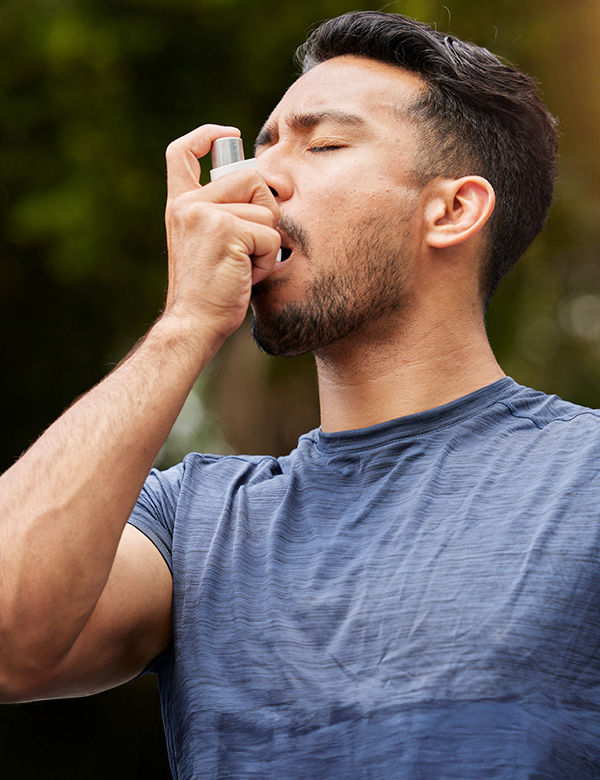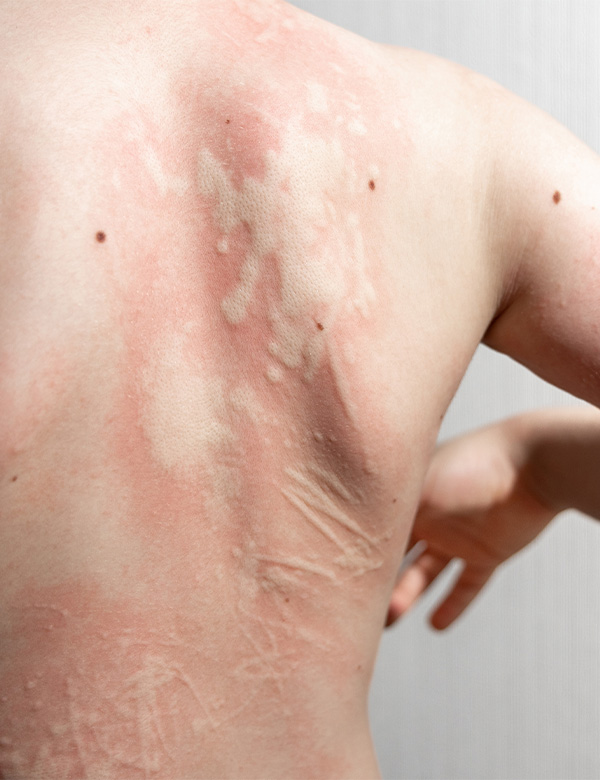Allergic Shock – Anaphylaxis
Recognizing, preventing, and treating severe allergies and allergic shock (anaphylactic shock) – assessment and care from an experienced allergist and dermatologist at Derma Medical Clinic in Zurich – Sihlcity
Allergic Shock – Anaphylaxis
Chronische Abszesse und schmerzhafte Knoten durch erfahrenen Hautarzt abklären und behandeln in der Derma Medical Clinic in Zürich - Sihlcity
Sudden shortness of breath, skin reactions, or circulatory issues after contact with allergy triggers: an allergic shock is a medical emergency – we offer testing for triggers as well as advice on emergency medications, what to do in a crisis, and how to prevent future reactions.
Examinations
Allergy testing
Procedure
Initial consultation incl. allergy test
Duration
30 minutes
What Is an Allergic Shock?
An allergic shock – also known medically as an anaphylactic shock – is a particularly severe immune system reaction. It can be triggered by certain foods (e.g. nuts, seafood), medications, insect venom, or other allergens.
Typical signs are sudden skin rashes, shortness of breath, swelling, or circulatory problems. Without quick treatment, anaphylaxis can become life-threatening.
Testing is especially recommended if you …
- have had shortness of breath, dizziness, or circulatory problems after eating certain foods or taking medications
- have ever reacted to a food item, medication, or insect sting with sudden skin reactions, swelling, trouble breathing, or circulatory issues
- know you are allergic to certain substances but are not sure how serious the risk is
- already have an emergency kit, but are unsure how to use it
- want to stay better protected during travel, surgery, or allergy seasons

What Is an Allergic Shock?
An allergic shock – also known medically as an anaphylactic shock – is a particularly severe immune system reaction. It can be triggered by certain foods (e.g. nuts, seafood), medications, insect venom, or other allergens.
Typical signs are sudden skin rashes, shortness of breath, swelling, or circulatory problems. Without quick treatment, anaphylaxis can become life-threatening.
Who Should Consider Testing for Allergic Shock?
Testing is especially recommended if you …
- have had shortness of breath, dizziness, or circulatory problems after eating certain foods or taking medications
- have ever reacted to a food item, medication, or insect sting with sudden skin reactions, swelling, trouble breathing, or circulatory issues
- know you are allergic to certain substances but are not sure how serious the risk is
- already have an emergency kit, but are unsure how to use it
- want to stay better protected during travel, surgery, or allergy seasons
Treatment
First, we talk about your past reactions and possible triggers. Depending on your case, the following steps may be done:
- Allergy testing for possible triggers
- rule out other causes such as skin conditions or infections if needed
- evaluate your risk and create a personalized emergency plan
What Happens After the Diagnosis?
If your risk is increased, we will review the next steps with you in detail:
- Set up an emergency kit
- Training on how to use it – so you or your relatives can respond if needed
- Prevention tips for everyday life, travel, or medical procedures
- Desensitization, if the trigger is clearly identified (e.g. insect venom, pollen, or dust mites)
How Is Testing for Severe Allergies Done?
Initial consultation
In our first appointment, we take time to talk about your past reactions, possible triggers, and your medical history.
Allergy test
Depending on suspicion, we perform a prick test (allergens placed on lightly scratched skin) or a blood test.
Emergency kit
If you are at increased risk for an allergic shock, we provide you with an emergency kit. We guide you step by step through how to use it.
Advice on prevention & long-term strategy
If desensitization is an option, we explain how the therapy would work.

At the Derma Medical Clinic, allergy treatments are performed by Dr. Markus Dendorfer, dermatologist and specialized allergist.
He has many years of experience in diagnosing and treating allergic conditions – from hay fever to complex allergic reactions.

Dr. med. Markus Dendorfer
Board-certified Specialist in Dermatology & Venereology FMH
What You Can Expect from Us:
Identifying allergies
We check if you’re at increased risk for allergic shock and what exactly can be done to prevent it.
Child-friendly diagnostics & support
With children, we take a gentle approach, explain things in a way they understand, and support families with empathy and clarity.
Knowing what to do in an emergency
We’ll walk you through how to respond in an emergency, including hands-on training for using an adrenaline pen.
Everything in one place
You’ll receive diagnosis, medical care, and cosmetic support all in one place. This means short waiting times, a coordinated care plan, and one go-to team from first consultation to follow-up.
Severe allergic reactions should be taken seriously.
Book your allergy evaluation appointment now at Derma Medical Clinic in Zurich – Sihlcity.
FAQ – Common Questions About Allergic Shock
What is anaphylaxis?
Anaphylaxis is the most severe form of an allergic reaction and is a medical emergency. The immune system overreacts to allergens like certain foods, insect venom, or medications. Without quick treatment, it can lead to anaphylactic shock, which can be life-threatening.
What are symptoms of anaphylaxis?
Typical signs include:
- sudden skin reactions (hives, redness, severe itching)
- swelling of the face, lips, tongue, or eyes
- shortness of breath, tight chest, coughing
- nausea, vomiting, or stomach cramps
- circulatory issues, possibly unconsciousness
These symptoms usually appear within minutes of contact with the allergen.
What are common triggers of anaphylaxis?
The most common triggers include:
- foods (e.g. peanuts, tree nuts, fish, eggs, milk)
- insect stings, especially from bees or wasps
- medications (e.g. antibiotics, painkillers)
- latex
In some cases, physical activity or infections can worsen the reaction.
What should I do in an anaphylactic emergency?
Act fast:
- Use your adrenaline pen (e.g. Epipen)
- Call emergency services (in Switzerland: 144)
- Lay the person flat; if they’re struggling to breathe: raise the upper body slightly
- Stop contact with the trigger immediately
- Stay calm and wait for medical help
If no emergency kit is available: call for medical help immediately!
What’s in an anaphylaxis emergency kit?
A doctor-prescribed emergency kit usually includes:
- adrenaline autoinjector (e.g. Epipen)
- an antihistamine
- a corticosteroid
- if needed: an asthma spray
You should always keep this kit with you – and know how to use it.
Can allergic shock be prevented?
Yes, with options like:
- consistently avoiding allergens
- Hyposensitization, e.g. for insect venom allergy
- a tailored emergency plan
- training to recognize and respond early
What’s the difference between desensitization and hyposensitization?
In medical terms, desensitization and hyposensitization mean the same: a specific immunotherapy in which the body is gradually exposed to an allergen. The goal is to reduce or stop allergic reactions in the long term. “Hyposensitization” is more commonly used in medical language; “desensitization” is more common in everyday speech.
Is anaphylaxis curable?
Anaphylaxis itself is not curable, but the risk can be reduced. With early diagnosis, strict avoidance of allergens, having the right emergency kit, and possibly hyposensitization, dangerous situations can often be prevented or better managed.
When should I get tested for anaphylaxis?
You should consider getting tested if you …
- have had a severe allergic reaction before
- had shortness of breath or circulation issues after an insect sting, medication, or food
- have a family history or are unsure about your triggers
An allergy diagnosis can give clarity – and save lives.




